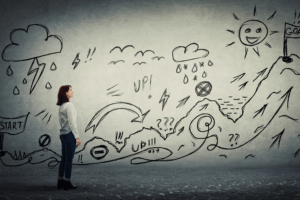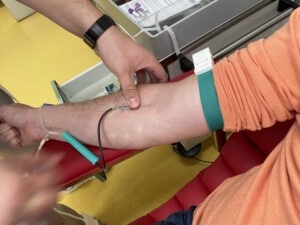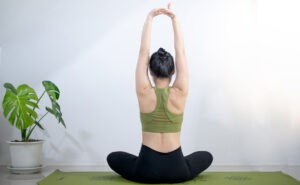
Far from simply ‘the strange aisle in your local bookshop’, the concept of self-development has been around for thousands of years. In fact, it could be argued that Aristotle himself is the godfather of self-development.
In his 2300-year-old scriptures on ethics, he discusses personal development, stating that the practice of virtues leads to ‘Eudaimonia’, translating as ‘human flourishing.
So, how do we, as humans, flourish?
Here we take a look at what self-development is, and is not, its history and importance to us as humans, and some ways to try it out for yourself.
All of us here at One Year No Beer is fascinated with self-development. We think it is one of the most important areas of your life that you should spend time investing in, and one that takes a lifetime of practice to master.
Giving up alcohol or at least changing your relationship with alcohol may enable you to take even more from the process of self-growth.
What is self-development?
Self-development can be described as many things, but at its core, it is the expansion of self-awareness leading to the understanding of one’s self and identity. Through the tools and activities used to support our self-development, we can develop our talents and potential, helping us to reach our goals and dreams.
Ultimately, self-development and its results can enhance our quality of life and increase our happiness. We like to refer to self-development as the ‘creation of an authentic life’ – one that’s unique to us, our dreams, passions, and needs.
And it’s a big, far-reaching industry that has touched many generations. The first ever self-development book was the 1859 best-seller Self-Help by Samuel Smiles.
Since then, How to Win Friends and Influence People (probably the most famous self-help book in modern history, written by Dale Carnegie, published in 1936 and sold over 15 million copies worldwide since, making it one of the best-selling books of all time).
The Artists Way by Julia Cameron (first self-published in 1992, going on to be listed in the Top 100 Best Self-Help Books of All Time and eventually added to the ‘Self-Publishing Hall of Fame’ after selling millions of copies worldwide), self-help, self-development, and self-improvement has rocketed in its popularity over the past century, and it only continues to grow.
The self-improvement industry is estimated to be worth $11 billion in the United States alone, and $500 million is spent on personal development products every year.
What it isn’t
However, the self-development world can sometimes find itself subject to criticism.
Many put self-development practices or ideas down, and dismiss them as ‘fluff’ or as scams. Of course, we must be discerning when it comes to following someone else’s advice about our own life and checking our credentials before working with someone.
Ultimately, it’s important to remember that no one else can make promises about our own lives; the power lies with us.
Experts such as Mastin Kipp advise against ‘spiritual entertainment’, wherein we become trapped in the circle of reading or participating in self-development practices for entertainment, and yet never show up to actually ‘do the work’ – make the changes, look deeply within, or take the time to answer the questions we are asked.
Self-development is about developing yourself, by yourself. Simply reading, watching, and listening to others and hoping for the best will not create the changes and transformations you might hope for.
Importance of self-growth
Why is self-development important?
Humans have long known the importance of self-growth.
In fact, it could be argued that the evolution of man, along with all of our skills and creations, is proof of our inherent desire to grow, develop and improve.
The thread that weaves throughout both, is the willingness to look within in order to understand ourselves. In more modern times, Psychologist Carl Jung did extensive and profound work on the shadow self and the ego that holds us back and keeps us stuck.
A quote I love that sums up his ideas perfectly is this;
‘Until you make the unconscious conscious, it will direct your life and you will call it fate.’
Ultimately, awareness and deeper knowledge of our weaknesses and strengths, our true soul desires and desire of the ego, our truths, and our fabricated beliefs, will lead us to make better choices in order to create a life that makes us truly happy.
And thousands of years before Jung, sages took themselves to the mountains to contemplate their lives and understand themselves better. Ideas and practices were shared along the silk trading routes across the Himalayas, and the foundations of eastern yogic and Buddhist philosophy were born.
Self-study has since been an important duty one must observe when following a yogic path – appearing in the second limb of yoga (of which there are eight in total – the physical poses being only the third limb!). In reference to self-study, the ancient yogic text The Yoga Sutras of Patanjali (written prior to 400CE), he states: ‘through focusing our attention onto our habits and conditioning, we gain knowledge and understanding of our past and of how we can change the habitual patterns that aren’t serving us in order to live more freely and fully.’
Historically, self-study (self-development), has played an important role in many cultures, philosophies, and ultimately, for humans throughout time. It seems no matter how our world changes, the acquirement of self-development will always be a natural inclination for humankind.
7 Things You Can Do in Your Daily Life to Improve Your Personal Development
How to improve personal development
Self-improvement comes in many shapes and sizes and there is more or less something to suit everyone, from different goals to different needs to different learning styles. The answer to “how to work on Self-development” doesn’t have to be read from a book, or attended in a seminar – there are many different ways to learn to look within and create change.
Different types of self-development activities to try today
With this in mind, here are 6 things you can do in your daily life to improve your personal development. Here are a few of my favorites:
Coaching
One-on-one life coaching is the ultimate modern self-development tool. Sessions consist of direct and dedicated questions to help you put light on and confront limiting beliefs and habits, goal setting with accountability, and homework.
Choosing a coach that suits your personality and learning style is important.
Therapy
Talking therapy is great for those who might have some healing to do along their self-development journey. While coaching mainly looks forward, therapy and counseling can take a look back to past situations and traumas that might need recovery before steps can be taken forward.
Challenges
Taking up a challenge that pushes you out of your comfort zone and towards a goal you never thought possible is a surefire way to grow out of old limiting beliefs and smash through the barriers that are holding you back in life.
It might be running a marathon, or giving up alcohol for a year, which is a challenge I recently set myself and succeeded at, learning a huge deal about myself and growing as a person along the way. Getting the right support or even a coach can help to depend on the difficulty of the challenge you set.
If you are looking for a challenge to embark on while we are all in lockdown then The 28-Day Challenge could be just the one for you! Have you ever thought about giving up alcohol before? This is a great first step for those looking for self-growth. No better time to start than today…
Take the Challenge
Journaling
If talking isn’t your thing but writing is something you love, or find creative or cathartic, journaling can be a great source of self-development. One of my favorite journaling tools comes from Cameron’s The Artist’s Way. She prompts us to wake half an hour early to complete three pages of stream-of-consciousness style writing each morning.
The one caveat is that we do not read them once written and that they are kept private. ‘Welcome to the morning pages,’ she says, ‘They will change you.
Yoga and Meditation
A great deal can be taken from these ancient practices, especially if the more modern and often forthright techniques of coaching for self-development aren’t your style.
In Eastern philosophy, the study of the ‘self’ is often as important as eating, keeping clean, or exercising. Wisdom is something that is and always has been, within and it is also something we can practice building a stronger connection to. This is why so many of us keep coming back to ancient Eastern practices, such as yoga and Buddhist meditation.
They can provide us with the very important tool of mindful awareness, which can create a conversation between the body, mind, and our inner wisdom. Modern science confirms this with research that has found the techniques of Mindfulness can help us understand and get to know ourselves on a deeper level.’
Podcasts
Podcasts are a great way to listen to motivational speakers and experts talk live, with passion, and in a way that can often hit home. Happier With Gretchen Rubin does what it says on the tin, she’s also got a great book on the subject too.
For those looking to simplify their lives, The Minimalists is a must-listen. And I couldn’t include the Psychologies Podcast Channel – with some of the top self-development experts in the world from Brene Brown to Gabrielle Bernstein, they ask the questions everyone wants to know the answers to, always with kindness and curiosity on subjects ranging from changing your life to using mindfulness for a busy mind.
Mastermind
Have you noticed, most self-help courses, books, or programs go about things one of two ways?
The first way is to make everything incredibly generic. On the surface, they sound good, but when you peel back the surface, you soon realize, none of it actually means anything.
The second way is to make everything far too specific. We’ve all seen the courses designed to help you, but there are a few problems with their approach.
Mastermind works as a self-development program as you have accountability, you are surrounded by a supportive, close-knit, community and it is a tried-and-tested process.
Live Life Better with these self-help tips
Self-development doesn’t need to be anything big and scary. All it takes is getting to know yourself better, and it can start with something as small as reading a book, learning yoga, or listening to a podcast.
Hopefully, you found these self-development tips helpful and you are ready to start your own self-improvement journey today!





































